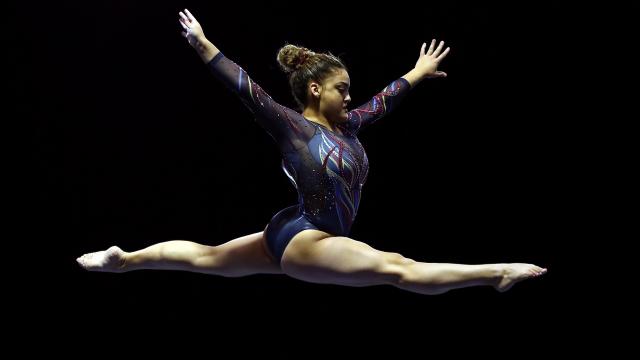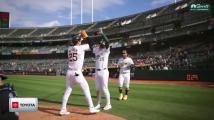The Rush: Gold medal gymnast Laurie Hernandez on competing without fans at the Olympics
Gold medal gymnast Laurie Hernandez joins the rush to disclose her weirdest fan interaction, the increasing importance of mental health for athletes, and why the lack of fans at the Olympics will have an impact. PLUS: Laurie explains why Dr Teal’s Epsom Salt is great for recovery!
Video Transcript
LAURIE HERNANDEZ: Tell me you played sports without telling me you played sports. I'll start.
[MUSIC PLAYING]
JARED QUAY: What's up, everybody. I'm here with gold medal gymnast Laurie Hernandez. How are you doing today, Laurie?
LAURIE HERNANDEZ: I'm doing really well.
JARED QUAY: There was like a 90s boy band type of obsession when it comes to you and the final five from 2016. And so my question is, what's the craziest fan story you have since then?
LAURIE HERNANDEZ: Oh, the craziest fan story-- I mean, one time I signed a potato. Like, someone brought a straight up potato to the meet and greet and was, like, can you sign my potato? And I was, like, this is one I'm going to be remembering for sure. It was just so absurd. I loved it.
JARED QUAY: Staying with the Olympics, you'll be on the ground there. But it'll be in a different vibe with COVID. My question to you is, what are athlete's going to miss out on the most this year that they would have probably got last Olympics?
LAURIE HERNANDEZ: I think the toughest part, like with COVID related things, is the fact that there aren't going to be any spectators. It definitely makes things really difficult just because a lot of athletes, like track runners and pole vaulters and swimmers, like, a lot of us, we feed off of the crowd interactment. And so it's like when we finished a floor routine or something or we do something and we hear people clap, it's like immediate feedback on how we did. And it feels good to connect with the crowd in that way.
So to not have that, it's definitely going to change the dynamic of the competition. But at the same time, like, we're all used to training on our own. It's not like we train with a crowd every single day. So it won't be too different. It'll just be a little more mellow. You know?
JARED QUAY: Simone Biles is right now is the undisputed GOAT. But like to a casual observer, what makes her so incredible?
LAURIE HERNANDEZ: I mean, she has literally more than one skill named after her. You know, the way that you get skills named after you is that you go compete internationally at a world championships or at an Olympic championships or World Cup and you perform the skill and you nail it. And as long as you hit it and nobody's done it before, that skill takes your last name. And she has multiple skills under her name within the last two quads.
That's pretty crazy. And just her air awareness is something definitely to keep an eye out on just because she does some crazy stuff in the air. And you can tell she knows exactly where she is. So I think that's where all the hype comes from.
JARED QUAY: Speaking of crazy routines injuries became a big part of gymnastics. So what are your tips for recovery?
LAURIE HERNANDEZ: Recovery is so important. It's underrated. I don't think it's talked about enough. Dr. Teal's new Performance Epsom Salt Soak, in my opinion, it helps speed recovery time-- combining pure Epsom salts, menthol, and a few other things to ease muscle aches and joint pain. Honestly, that's, like, a really great way to take care of your body. Like going in, getting a warm bath, and using this-- it just makes sense.
JARED QUAY: You're a big mental health advocate. And a lot of high profile athletes are dealing with more pressure than ever. So what is the best thing athletes can do for their psychology aside from staying away from social media?
LAURIE HERNANDEZ: Staying away from social media-- that would be my number one. Honestly, I think just doing daily and hourly check-ins with yourself, especially while you're at the games-- making sure that you're eating, that you're sleeping, that you're drinking water, that you're getting some rest, that you're able to still connect with others, that you're going outside even if there's a little balcony or just some way to get a little sunshine.
Tick off all those little mental health boxes to make sure that you're doing the best you can to nurture yourself while you're out there. And if there is a problem, find somebody hopefully out there that you trust and that you feel comfortable talking to. And if not, journaling is great. But definitely getting that support system.
JARED QUAY: That's amazing for all people. That's not just athletes, those are great tips.
LAURIE HERNANDEZ: Yeah.
JARED QUAY: Yeah. You're like above your years. I feel like you've already done so much in your life, right? You got these accomplishments on your Wikipedia page. And you're only 21 years old. Like, what else is there left? Like, what are you going to do after you're done with gymnastics?
LAURIE HERNANDEZ: Honestly, I want to go to college for acting and entertainment. I am kind of just dipping my toe in multiple areas of that, whether that be, like, screenwriting or producing something or acting or theater, music, whatever that is.
[MUSIC PLAYING]
I kind of just want to touch every aspect of it because I'm really passionate about all of them and I'm such a crowd pleaser. I just think it would be a lot of fun.
JARED QUAY: Obviously, I hope everyone follows you and your social channels in Tokyo because it'll be cool. Laurie, I appreciate you coming on the show with me today and [INAUDIBLE] with me. Hope you recover well. And we're looking forward to seeing you. And enjoy Tokyo.
LAURIE HERNANDEZ: Sweet. Thank you so much.








